What to expect for the housing market in 2020

It’s shaping up to be a pretty strong year ahead for Canada’s real estate market.
In a new report, Zoocasa expects strong momentum from the second half of 2019 to carry over into 2020 as buyers continue to shake off the federal mortgage stress test along with provincial policies and taxes.
“Canada’s largest urban centres, such as the Greater Toronto Area and Greater Vancouver, as well as its strongest secondary markets, started to experience sustained rebounds in home buyer demand due to a number of factors, including lower interest rates; a subdued Bank of Canada, combined with strength in the bond market, kept the consumer cost of borrowing at historic lows all year long,” said Penelope Graham, Zoocasa’s managing editor, in the report.
“That’s helped soften the blow of the stress test, which requires insured mortgage borrowers to qualify at the Bank of Canada’s five-year benchmark rate, while uninsured borrowers must qualify for a rate roughly 2 percentage points higher than the one they’ll get from their bank.”
The qualifying rate could go lower because Finance Minister Bill Morneau is expected to take another look at the criteria.
“While no details have been released as of yet, this could include lowering the qualifying rate from its current 5.19%, per cent or making it more dynamic based on individual borrowers’ profiles,” said Graham.
“As well, they could remove the current requirement for borrowers to be re-stress tested when switching lenders, a measure that has drawn heavy criticism from the mortgage industry for discouraging consumer empowerment and competitiveness.”
Zoocasa also expects mortgage rates to remain cheap, giving buyers more purchasing power.
How high can it go?
The Canadian Real Estate Association (CREA) expects sales to increase by 8.9 per cent next year, which will push the national average price up by 6.2 per cent to $531,000.
Canada Mortgage and Housing Corporation’s (CMHC) gives a range, but the forecast is similar, predicting sales to rise by about 6 per cent. It expects the average price to go up between 5.6 per cent and 6.7 per cent to between $506,200 and $531,000.
Jessy Bains is a senior reporter at Yahoo Finance Canada. Follow him on Twitter @jessysbains.
Download the Yahoo Finance app, available for Apple and Android.

 Yahoo Finance
Yahoo Finance 